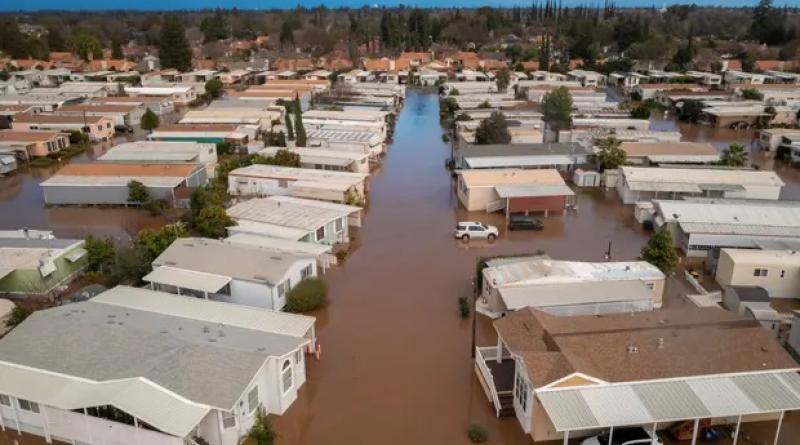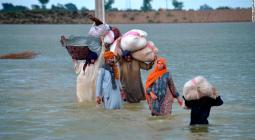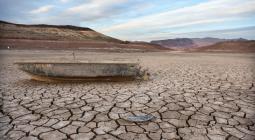Today, California is hammered by extreme weather. Tomorrow, it could be your area

Even if disasters feel far away, we all live in the same planetary neighborhood. Can we unite in our response to the crisis?
I live in the Bay Area, famous for its mild weather, a place where climate change feels a bit abstract – the problem of people residing in distant lands. It’s easy to scroll through images of the increasing weather disasters – cyclones, tornadoes, blizzards, floods, mudslides, rising seas and wildfires – feeling horror but also a little smug at the luck of living in the land of year-round shorts and relentless sunshine.
But our luck changed on New Year’s Eve, when a line of killer storms began to assault California, soaking us with 24tn gallons of water, killing 19 people and causing more than $1bn in damages.
While it’s true that Californians have been living under a historic, 20-year drought, the water shortage has never seemed quite real: there’s always water in the tap.
This same attitude of remove prevails regarding the record number of drought-induced wildfires in our state – most occur in remote areas, out of sight. When our family vacation at Lake Tahoe was cut short by a wildfire in 2021, we simply drove home to clean air – until the smoke followed us, blackening the sky at midday and toxifying the air. Even then, our discomfort was short-lived – we bought air purifiers and masks. There’s always a fix, a hack, a workaround. I snapped photos of my daughter walking to school under the eerie orange sky as a souvenir of this blip in our lives. A few days later, our blue sky returned, as seemingly reliable as the tourists mobbing Fisherman’s Wharf.
These past two weeks, however, have brought the planetary emergency into our living room. The disaster images come from our neighboring towns, affecting people and places we know.
Rain has been so rare in my kids’ lifetime, that even now, at 13 and 16, they will race outside to dance with joy whenever it falls from the sky. They understand, at a primal level, that water is life, just as air is life. As a household, we try to conserve water by landscaping with drought-tolerant plants and collecting the cold water that first jets from the shower in buckets to water them.
So when the first drenching rain came on New Year’s Eve, I felt a deep gratitude. Our reservoirs would be replenished. Our parched earth would be quenched. But then the celestial spigot kept gushing, day and night, and now we are drowning. At one point, 90% of California was under a flood watch. The “bomb cyclone” yanked 15 giant fronds from the palm tree in our yard in one fell swoop and dashed them on to the street like matchsticks. Friends have been without power for days. But these experiences pale compared to the heartbreaking ordeals of some, including the mother whose five-year-old son was pulled from her arms by a flash flood or the parents whose toddler was crushed by a falling tree.
Although eight in 10 Californians say they worry about climate change, their responses to the crisis often baffle me. Despite continued warnings to conserve water, some wealthy homeowners insist on keeping their emerald lawns with a to hell with the rest of you obstinance, depleting a resource that we all depend on.
And now, while thousands of Californians have evacuated their homes due to rising water, others have treated the storms as an amusement, surfing beneath the Golden Gate Bridge, kayaking on surging rivers and flooded city streets.
This disparity of effect and reaction reminds me of Lars Von Trier’s brilliant film Melancholia. When the characters learn that a rogue planet is set to collide with Earth – decimating life – their responses couldn’t be more dissimilar. One kills himself, another chooses wine and denial, a third is fascinated by the wisps of electricity that rise from her fingers in the charged atmosphere.
After the water recedes and the mud is cleaned up and the bodies retrieved, when things go back to “normal”, what wisdom will we draw from this collective experience? What will we do to try to stave off more severe storms in the future? Will we make changes in our daily lives that sacrifice convenience for sustainability? Will we demand that our governments and corporations implement policies to reduce greenhouse gases?
The extent to which climate change affects you or I is largely based on geography and dumb luck. Today California is getting hammered; tomorrow, your area may be. We all live in the same planetary neighborhood. What remains to be seen is how we, as global citizens, will unite in our response to a crisis that affects us all. We can’t live in a La La Land of workarounds and denial forever: eventually, lethal weather will come for us all.
-
Julia Scheeres is a California-based journalist and a founder of Sustainabar, which makes zero-waste bars of common household products
COVER PHOTO: ‘We can’t live in a La-La Land of workarounds and denial: worse weather is coming.’ Photograph: Lipo Ching/EPA




